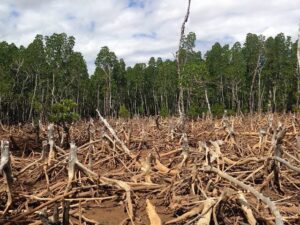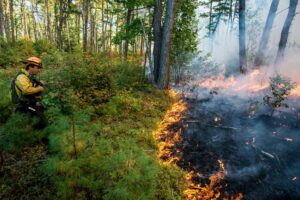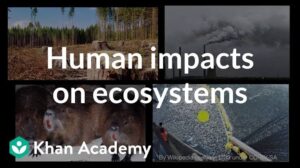Back to: Environmental Biology 200 Level
Welcome to class!
Hello, my amazing learner! Think about your last trip to a busy market or a farmland near your town. Did you notice how roads, buildings, or farms change the natural look of the land? Humans are powerful — we build, farm, mine, and even create new cities. But these activities also affect plants, animals, and the balance of nature. Today, we’ll discuss Human Impacts on Ecosystems — and you’ll learn how our everyday actions shape the environment around us.
Human Impacts On Ecosystems
What are Ecosystems?
An ecosystem is a community of living organisms (plants, animals, microbes) interacting with each other and their physical environment (air, soil, water). Examples include a Nigerian rainforest, a fishpond, or even your school garden. Ecosystems depend on balance — when this balance is disturbed, the whole system suffers.

Positive Human Impacts
Not all human activities are harmful. Some actions improve ecosystems:
Afforestation: Planting trees helps fight erosion and restore forests.
Wildlife conservation: National parks like Yankari Game Reserve protect endangered animals.
Sustainable farming: Using compost or crop rotation maintains soil fertility.
Negative Human Impacts
Sadly, many human actions harm ecosystems. These include:
Deforestation: Cutting down trees for timber or farming destroys habitats and leads to soil erosion.

Pollution: Waste from factories, oil spills in the Niger Delta, and plastic in rivers harm wildlife and water quality.
Overfishing: Removing too many fish reduces species and damages aquatic ecosystems.
Urbanisation: Building roads and cities destroys natural habitats and increases flooding.
Climate change: Burning fossil fuels releases greenhouse gases, leading to rising temperatures and unpredictable rainfall patterns.
Examples in Nigeria
Oil spills in the Niger Delta have killed fish and poisoned mangroves.
Uncontrolled bush burning in northern Nigeria reduces soil fertility.
The drying up of Lake Chad is linked to human water use and climate change.
How Humans Can Reduce Negative Impacts
We can protect our environment by:
Recycling and proper waste management.
Planting trees and avoiding bush burning.
Using renewable energy like solar power.

Supporting laws that protect wildlife and forests.
Why It Matters
When ecosystems are damaged, humans suffer too — less clean water, fewer crops, more floods, and loss of important species like bees that pollinate our food crops. Protecting the environment means protecting our future.
Summary
- Humans can positively or negatively impact ecosystems.
- Deforestation, pollution, overfishing, and climate change are major threats.
- Conservation, tree planting, and sustainable practices help restore balance.
- Nigeria’s environment shows both the effects of damage (oil spills) and the power of protection (national parks).
Evaluation
- Mention three negative human impacts on ecosystems with Nigerian examples.
- What is one positive way humans can restore ecosystems?
- Explain why deforestation affects both animals and humans.
- Suggest two simple ways you can protect the environment as a student.
Fantastic work today! Remember, you have the power to protect nature, even through small actions like planting a tree or avoiding waste. Keep this energy as we continue learning with Afrilearn!
